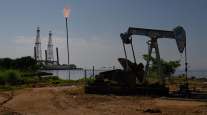Oregon Gov. Kate Brown Renews Call For Oil Train Moratorium

Gov. Kate Brown again called for a moratorium on oil trains in Oregon, after federal regulators released findings June 23 that blamed this month's fiery derailment and spill in the Columbia River Gorge on Union Pacific's failure to maintain its tracks.
The governor's office also told The Oregonian/OregonLive it's considering going to court to stop oil train traffic. The comments from Brown's office come the day after Union Pacific announced plans to resume running oil trains after the disaster in Mosier on June 3.
States lack the power to halt train traffic on their own, so Oregon officials have been asking the Federal Railroad Administration to place a moratorium on the oil shipments until railroads and regulators can improve safety.
"We are considering all options, including litigation," said Bryan Hockaday, a spokesman for Brown.
Hockaday said "it's way too early to speculate who we would sue and what the substance of that litigation would be." But defendants could include the Federal Railroad Administration and Union Pacific. Hockaday said a lawyer and advisers to the governor were in talks with the Federal Railroad Administration throughout the day June 23.
In a preliminary report, the Federal Railroad Administration wrote that "Union Pacific's failure to maintain its track and track equipment resulted in the derailment" in Mosier.
Investigators found broken lag bolts, which fasten the rails to the railroad ties, had allowed the rails to widen, resulting in the derailment. The fasteners are sometimes referred to as coach screws.
Federal regulators also simulated the derailment using trains with different types of brakes, and found the crash might have been less serious if the Union Pacific train had been equipped with electronically controlled pneumatic brakes, instead of air brakes.
"Two fewer tank cars may have derailed, and one less tank car may have been punctured" if the train had pneumatic brakes, the Federal Railroad Administration wrote.
During the derailment, a coupler punctured one of the tank cars, allowing oil to leak out and ignite, according to the report. Four cars caught fire and leaked 42,000 gallons of oil.
The train had 94 cars loaded with Bakken crude oil, plus two "buffer cars," according to the federal report. The crash closed Interstate 84 and forced hundreds of people to evacuate as the fire burned for 14 hours.
FRA "is evaluating potential enforcement actions, including violations, and other actions to ensure Union Pacific's compliance with applicable safety regulations," the agency wrote in the report.
In a statement June 23, Brown said the federal report provided cause for renewed concern.
"The Federal Railroad Administration's preliminary Mosier derailment report calls attention to serious safety concerns and the need for improved track inspections," Brown said. "I expect the final investigation report to be completed quickly and again call on rail operators to halt oil trains in Oregon until the strongest safety measures are put in place by federal authorities to protect Oregonians."
Union Pacific informed local officials on June 22 that the railroad planned to resume oil shipments through the Columbia River Gorge this week. The company had temporarily stopped transporting oil through the gorge after the June 3 derailment.
The railroad issued a statement June 23, citing steps it is taking to improve safety and disputing federal regulators' finding that a different type of brake system would have worked better during the crash.
"Union Pacific's rail fastening system, which includes lag bolts, has an outstanding history of safety and reliability," the company said. "Since the June 3 derailment in Mosier, we are increasing the frequency of our inspections and including walking inspections of curves containing lag bolts. As part of our ongoing track renewal program, lag bolts with this fastener system are being replaced with rail spikes, which provide higher levels of defect detectability in standard inspection processes."
Union Pacific wrote that electronically controlled pneumatic braking technology "has yet to meet service reliability standards in industry tests, including by Union Pacific," and the train's use of distributed power provided "a braking capacity very similar to (electronically controlled pneumatic brakes)."




